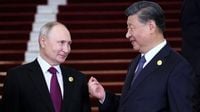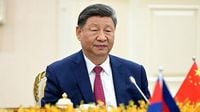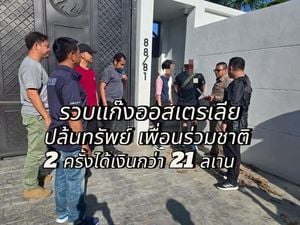Chinese President Xi Jinping hailed his country’s "resilient" ties with Russia on Wednesday, May 7, 2025, ahead of his visit to Moscow later in the day. This visit comes as part of a four-day state trip, during which Xi aims to deepen "mutual trust" with Russian President Vladimir Putin and participate in events commemorating the 80th anniversary of the Allied forces’ World War II victory over Nazi Germany.
In an article published in the Russian daily Rossiyskaya Gazeta, Xi emphasized the importance of the China-Russia relationship, stating that the two nations "should jointly resist any attempt to interfere with and undermine the China-Russia friendship and mutual trust." This sentiment reflects the growing camaraderie between the two countries, particularly in light of the shifting global political landscape.
Putin, who has labeled Xi as his "main guest" for the upcoming May 9 “Victory Day” military parade, has made it clear that the Chinese leader's presence is significant. Other leaders expected to attend the celebrations include Brazil’s President Luiz Inacio Lula da Silva, Vietnam’s President To Lam, and Belarussian leader Aleksandr Lukashenko. Additionally, contingents from the Chinese People’s Liberation Army honor guard will participate in the parade, adding a layer of military collaboration to the festivities.
The backdrop of Xi’s visit and the military parade is particularly poignant. As tensions escalate in Ukraine, Putin proposed a three-day ceasefire with Kyiv, which Ukrainian President Volodymyr Zelensky swiftly rejected, calling it a "theatrical performance." Zelensky reiterated his support for a previous US proposal for a 30-day ceasefire, emphasizing that Kyiv "cannot be responsible for what happens on the territory of the Russian Federation." This ongoing conflict has led to significant military actions, including Ukraine's largest attack on Moscow in March, which resulted in three fatalities.
Xi’s trip marks his third visit to Russia since the onset of Putin’s war over three years ago, and it comes at a time when China is facing 145% tariffs on most exports to the United States. The need to strengthen ties with Russia has become increasingly pressing for Beijing, especially as the US-China trade war escalates. As Xi prepares for discussions with Putin on Thursday, May 8, 2025, topics will include Ukraine, relations with the US, and the Power of Siberia-2 gas pipeline—a proposed natural gas line from western Russia to northern China that has long been in the planning stages.
The significance of this visit cannot be understated. Analysts suggest that Xi and Putin's meetings will likely send a strong message of alignment between China and Russia, especially as both countries seek to counter US unilateralism and hegemonism in international affairs. Yun Sun, director of the China program at the Washington-based Stimson Center think tank, noted that there are more incentives for China and Russia to present a united front amidst Washington’s policies that have created turbulence globally.
In the lead-up to the May 9 celebrations, Xi and Putin aim to frame themselves as responsible alternative leaders in contrast to the US. They plan to promote a vision of global governance that opposes unilateralism and advocates for multipolarity and inclusive economic globalization. An article from China’s state news agency Xinhua highlighted their commitment to leading the "correct direction of global governance" and working together to foster a more balanced world.
The geopolitical implications of Xi’s visit are profound, particularly as China and Russia have ramped up their economic and security ties in recent years. The two countries have reached record bilateral trade levels, with China emerging as a critical lifeline for Russia amidst international sanctions. Western governments have raised concerns that dual-use products from China, such as microchips and machine parts, are bolstering Russia’s defense capabilities, which has strained China’s relations with European nations.
As Xi navigates this visit, observers will be keenly watching for indications of how China’s relationship with Russia may evolve, particularly in light of potential shifts in US policy. Tamás Matura, a senior fellow at the Center for European Policy Analysis, pointed out that Xi’s discussions in Moscow will be closely scrutinized by European observers, especially regarding any meaningful dialogue about peace in Ukraine.
Ultimately, both Xi and Putin are likely to reinforce their longstanding partnership, which has been built on ideological and economic mutual benefits. Wang Yiwei, director of the Institute of International Affairs at Renmin University in Beijing, stated, "Russia stands jointly with China" on supporting the international order, emphasizing that the fundamental distrust of the US in both nations remains unchanged despite shifting political landscapes.
As the world watches this pivotal moment in international relations, the outcomes of Xi’s visit to Russia could shape not only the future of China-Russia relations but also the broader geopolitical dynamics in a rapidly changing world.





